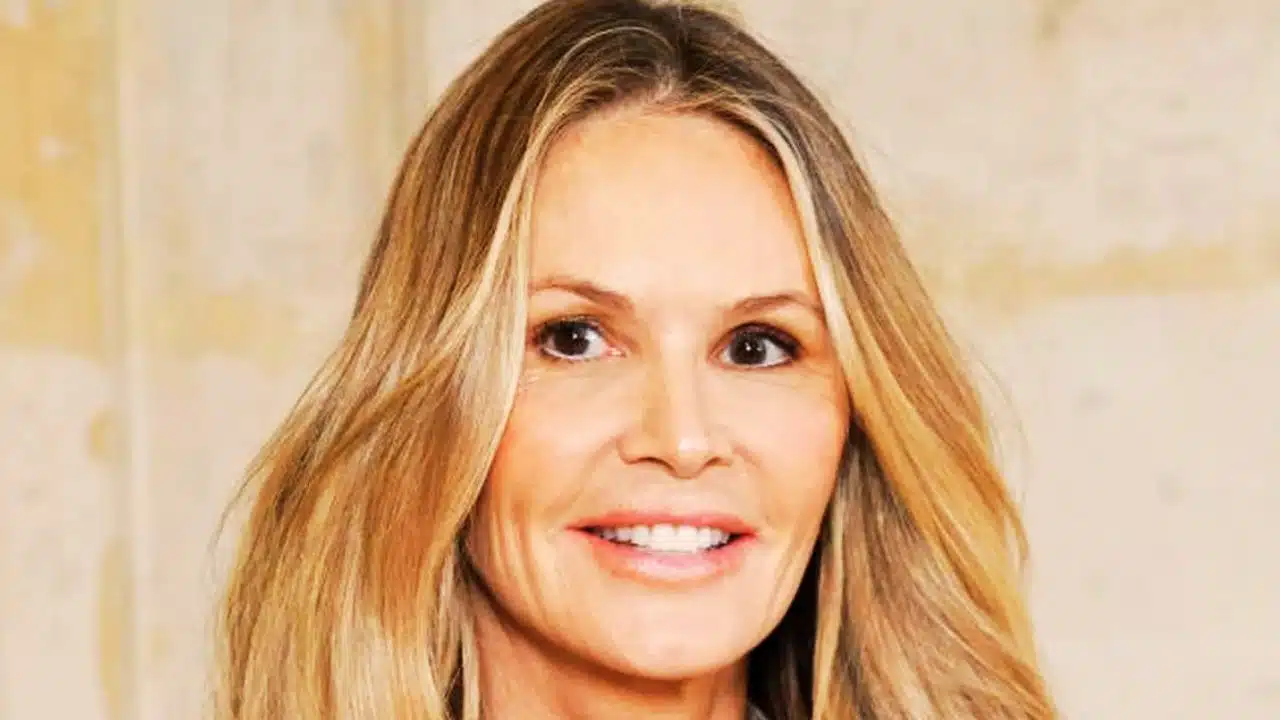Model and businesswoman Elle Macpherson recently opened up in a candid interview about a deeply personal decision she made after being diagnosed with breast cancer seven years ago. In the interview published by The Australian Women’s Weekly, Macpherson revealed that she chose not to undergo chemotherapy despite her diagnosis of HER2-positive estrogen receptive intraductal carcinoma, a type of breast cancer known to be aggressive. Instead, she opted for a holistic approach, trusting her intuition and body over traditional medical recommendations.
A Shocking Diagnosis and Life-Altering Choice
Macpherson’s cancer journey began unexpectedly when a routine lumpectomy, a surgery to remove a small lump in her breast, returned positive results for HER2-positive estrogen receptive intraductal carcinoma. HER2-positive breast cancer is a more aggressive form of the disease, often requiring comprehensive treatment. After her diagnosis, Macpherson consulted with 32 doctors, including her primary physician, who recommended a traditional treatment plan consisting of a mastectomy, chemotherapy, radiation therapy, hormone therapy, and breast reconstruction.
However, despite the overwhelming consensus among her medical advisors, Macpherson felt conflicted. Instead of immediately agreeing to the conventional medical treatments, she took time to reflect and seek guidance from within. She explained that she spent time praying and meditating on a beach in Miami, searching for clarity and peace in what was undoubtedly one of the most difficult moments of her life. During this time, she realized that she needed to approach her healing journey differently.
Trusting Her Intuition: Choosing a Holistic Path
Macpherson’s decision to decline chemotherapy and other traditional treatments wasn’t made lightly. She described it as an “intuitive, heart-led, holistic approach” to healing. This approach, she said, was rooted in her deep connection to her body and a belief in its ability to heal through non-invasive means. Instead of relying solely on conventional medicine, Macpherson chose to focus on holistic and integrative therapies that aim to treat the body as a whole.
“Trusting myself and trusting the nature of my body and the course of action that I had chosen was a wonderful exercise in being true to myself,” Macpherson told The Australian Women’s Weekly. She went on to describe the process as one of the most difficult decisions she’s ever made, emphasizing that it was an exercise in self-trust and authenticity. Macpherson’s belief in the power of her body and mind played a pivotal role in her treatment, even though it meant saying no to the standard medical solutions offered by her doctors.
An Alternative Approach to Cancer Treatment
Macpherson retreated to Phoenix, Arizona, where she rented a house for eight months as part of her healing process. There, she assembled a dedicated team of holistic practitioners to support her throughout her journey. This team included a naturopath, a holistic dentist, an osteopath, a chiropractor, and two therapists, all working together with her primary doctor, who specialized in integrative medicine. Integrative medicine is a growing field that combines conventional medical treatments with complementary therapies, such as acupuncture, yoga, and nutritional changes, to support the body’s overall health and healing.
For Macpherson, this combination of therapies was essential to her recovery. Although she did not disclose the specific details of her treatment, she emphasized that her approach was about healing her entire body and mind, not just treating the cancer. According to her, she’s now “in clinical remission” and feels “in utter wellness,” something she credits to the holistic, personalized care she received.
The Rise of Complementary and Integrative Therapies
Macpherson’s decision to pursue an alternative treatment path is part of a growing trend among cancer patients who seek integrative therapies. According to the National Center for Complementary and Integrative Health (NCCIH), complementary and alternative therapies are increasingly used to support conventional cancer treatments. These therapies are designed to improve a patient’s quality of life by alleviating symptoms, managing pain, and reducing the side effects of traditional treatments like chemotherapy and radiation. However, it’s important to note that while these therapies can offer support, none of them have been scientifically proven to cure cancer on their own.
HER2-positive breast cancer, the type Macpherson was diagnosed with, is often treated with targeted therapies in addition to chemotherapy. Advances in cancer research have led to the development of drugs that specifically target the HER2 protein, which promotes the growth of cancer cells. This has improved the prognosis for many women with HER2-positive breast cancer. While chemotherapy remains a common part of the treatment plan for most patients, recent studies have shown that some HER2-positive cancers may respond to less intensive chemotherapy regimens. This means that in certain cases, doctors may opt for a more conservative approach to treatment, though chemotherapy is still recommended for the majority of patients.
Dr. Eric Winer, director of Yale’s Center for Breast Cancer, has highlighted that even though chemotherapy for HER2-positive cancers may be less intensive in some cases, most women still need some form of chemotherapy to maximize their chances of recovery. However, Macpherson’s decision to reject chemotherapy entirely underscores the highly personal nature of cancer treatment and the importance of individual choice.
A Personal Journey, Not a Prescription
Macpherson has been clear that her story is not meant to serve as medical advice. In her interview with The Australian Women’s Weekly, she stressed that her decision was highly personal and based on her own unique experience. “This is not about giving advice to others,” she said. “I’m simply sharing what I discovered through my own real experiences.” She hopes that by telling her story, she can inspire others to trust their intuition and make the decisions that feel right for them.
Macpherson has also written about her cancer journey in her forthcoming autobiography, elle. In the book, she reflects on the lessons she learned during her battle with cancer and the importance of self-trust, resilience, and inner strength. Her story is one of empowerment and self-discovery, as she navigated the difficult terrain of a cancer diagnosis while staying true to her beliefs.
Macpherson’s Wellness Philosophy
In addition to sharing her cancer story, Macpherson has been vocal about her broader wellness philosophy. She is the founder of WelleCo, a wellness company that sells a range of health supplements designed to support overall well-being. The supplements are formulated by a clinical naturopath, Dr. Simone Laubscher, and are marketed as part of a holistic approach to health. Macpherson believes that her commitment to a healthy lifestyle and natural supplements has played a key role in her recovery and ongoing wellness.
“I’m in utter wellness now,” Macpherson said. “Saying no to standard medical solutions was the hardest thing I’ve ever done in my life. But saying no to my own inner sense would have been harder.” Her words reflect the deep conviction she holds about following one’s own path, even in the face of significant challenges.
Breast Cancer in the U.S.: The Bigger Picture
Breast cancer remains one of the leading causes of cancer-related deaths in the United States, with an estimated 42,780 people expected to die from the disease in 2024. However, advancements in early detection and treatment have led to a significant decline in mortality rates. Between 1975 and 2019, the breast cancer mortality rate dropped by an estimated 58%, a testament to the effectiveness of modern treatments like chemotherapy, targeted therapies, and early screening methods such as mammography.
Despite these advances, Macpherson’s story is a reminder that cancer treatment is not a one-size-fits-all solution. Every individual’s experience is unique, and decisions about treatment must be made based on a variety of factors, including personal beliefs, medical advice, and individual circumstances.
Reflecting on Her Experience
For Macpherson, her breast cancer diagnosis was not just a medical challenge but a journey of self-discovery. It forced her to confront her fears, trust her intuition, and find healing on her own terms. Her story resonates with many who face difficult decisions about their health and well-being, and it highlights the importance of making choices that feel aligned with one’s own values.
By sharing her journey, Macpherson hopes to empower others to take ownership of their health, trust their instincts, and explore all available options. While she acknowledges that her path may not be right for everyone, she believes that listening to her inner voice was the key to her healing.
In the end, Elle Macpherson’s decision to forgo chemotherapy in favor of a holistic approach underscores the deeply personal nature of cancer treatment. Her story serves as a powerful reminder that, while medical advice is crucial, each individual must ultimately decide what is best for their own body and well-being.







































